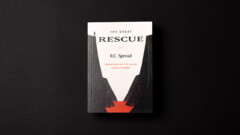By Reformed Presbyterian Theological Seminary.
You could see the panic rising in his eyes. As the collection plate moved ever closer to him, indecision tightened its grip on his heart. In his hand was a wad of cash, and, as he ruffled through the various bills, one could almost hear the question that echoed in his head. “How much should I put in the plate”? After years of being a deacon in a number of churches representing different denominations, I have seen this scenario played out regularly. Suddenly, as the pastor announces the collection of the offering, the struggle begins, almost as if it were a surprise that there would be a collection during worship.
Our pastors diligently prepare every week for worship. They spend hours reading the appointed text, consulting commentaries, writing prayers, and selecting appropriate music. Dr. Dennis Prutow, Professor Emeritus at the Reformed Presbyterian Theological Seminary, notes in the introduction to his book Public Worship 101, “There is a great privilege the people of God have of drawing near to God in corporate, public worship. In corporate, public worship, God is pleased to draw near to His people to renew His covenant with them and to assure them that they belong to Him and that He is indeed their God.”
Therefore, brothers, since we have confidence to enter the holy places by the blood of Jesus, by the new and living way that he opened for us through the curtain, that is, through his flesh, and since we have a great priest over the house of God, let us draw near with a true heart in full assurance of faith, with our hearts sprinkled clean from an evil conscience and our bodies washed with pure water (Heb. 10:19-22).
Just as the pastor has prepared for the Lord’s Day, the flock needs to prepare for the feeding that the shepherd is to deliver. The people need to open their ears to hear the spoken Word of God and draw the incredible joy that comes from the confidence in the knowledge of adoption into His family.
Attitudes about and attention to the stewardship of His things varies greatly amongst Christians. Some arrive to worship prepared, check written or cash counted, ready for the return of His bounty in our lives to further the work of the church in His kingdom. Other Christians give the topic little thought, randomly giving as they remember. I even know of a person who routinely placed an empty envelop in the collection plate so that those watching might think he was giving.
What are some things that we might consider as we think more intentionally about the stewardship of His things?
- Are you encouraged in your spiritual growth and trust in God as you give to the work of His kingdom?
- We recall that God is the owner of all things, and He has entrusted those things to our care and attention.
- When we are focused on God and His things, our priorities are changed from our self-focused desires and toward His kingdom. We no longer neglect His works in the pursuit of our own ambitions.
- Reflect upon the great and mighty things He is doing in the world. Globally, people are coming to faith in Christ, lives are being transformed, and He is being glorified.
- We are reminded to be joyful in our giving. We are in His presence in our acts of stewardship during worship.
Practically, we can be thinking of many things in our stewarding responsibilities.
- How are you preparing your children to worship God with tithes and offerings? At some point, a child needs to move beyond being given a coin to put in the basket.
- Have you thought about the things the Lord has entrusted to your care and how you will honor Him when you are called home – your Last Act of Stewardship?
- How well do you know the organizations that you support financially? Are they well-run and responsible, or are they working against His kingdom?
- Are you supporting the works of your own denomination or church?
Matthew 25 and Luke 19 record for us the parable of the talents. On the day of the settling of accounts, will the Lord make that pronouncement we so desire to hear, “Well done good and faithful servant”? Be faithful in the little that He has placed in your control.
Learn more about Reformed Presbyterian Theological Seminary at RPTS.edu.












